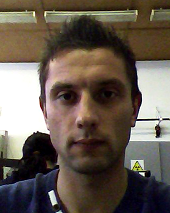
MSc. Benedikt Bergmann, Ph.D.
Personal data
So far, I have dedicated most of my professional career to improving the understanding of the interaction of ionizing radiation in matter and advancing pixelated radiation detectors for radiation dosimetry. My current research is focused on high-energy physics, accelerator and the space radiation environments. Given the harsh mixed radiation environment in these fields, during my research, I had to acquire an understanding of processes leading to radiation-induced failures of electronics, total ionizing and non-ionizing dose effects on the degradation of semiconductor sensors, and possible mitigation strategies.
Within my scientific career, I have contributed to a better understanding of fundamental physics processes. For example, I have designed simple table-top experiments to study half-life times and particle emission probabilities in radioactive decays with a yet unprecedented accuracy. In a neutron time-of-flight measurement, performed at the Los Alamos Neutron Science Center, I have studied the competition of non-ionizing (NIEL) vs ionizing energy losses (IEL) in silicon, crucial not only for understanding of sensor degradation, but also for proper SEE prediction.
Analyzing and interpreting SATRAM (Space Application of Timepix Radiation Monitor) data, I became familiar with the radiation environment in LEO. The successful operation of this instrument and the competitiveness of the obtained results became the foundation for further development of Space radiation environment monitors using later generations of the Timepix technology. I have been involved as key personnel in several ESA projects and was the co-proposer of a ground-breaking instrument using the magnetic spectrometer principle, the Penetrating Particle Analyzer (PAN), dedicated to an in-situ measurement of galactic cosmic ray properties.
I have given invited talks at international conferences, as well as seminars and lectures at international summer schools. Amongst others, within CERN’s EP seminar series (2024), at the School on Space Qualification (2024), the conference Advances in Space Astroparticle Physics (2023), the IEEE real-time conference (2022) or the International Workshop of Radiation Imaging Detectors (2022).
I am currently also a member of the Evaluation Panel P203 (Nuclear and Particle Physics, Astronomy and Astrophysics) of the Czech Science Foundation.
Publications
Loading data
Grants
Loading data

